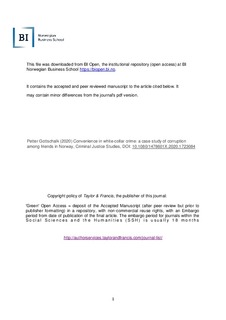| dc.contributor.author | Gottschalk, Petter | |
| dc.date.accessioned | 2020-02-05T12:17:08Z | |
| dc.date.available | 2020-02-05T12:17:08Z | |
| dc.date.created | 2020-01-29T07:33:48Z | |
| dc.date.issued | 2020 | |
| dc.identifier.citation | Criminal justice studies. 2020, 1-12. | nb_NO |
| dc.identifier.issn | 1478-601X | |
| dc.identifier.uri | http://hdl.handle.net/11250/2639816 | |
| dc.description.abstract | The theory of convenience is an emerging approach to explain the occurrence of white-collar crime. Convenience theory suggests that there is a financial motive enabling the offender to exploit possibilities and avoid threats, an organizational opportunity to commit and conceal crime, and a personal willingness for deviant behavior. This article tests the theory by a case study of a logistics manager who entered into corrupt relationships with friends who were suppliers. Among the many themes included in the structural model of convenience theory, the case study illustrates occupational rather than corporate crime that benefitted the offender personally. The motive was greed, while the opportunity was caused by status and lack of oversight and guardianship. His willingness was based on his choice of private relationships where he could justify his actions and neutralize feelings of guilt. | nb_NO |
| dc.language.iso | eng | nb_NO |
| dc.publisher | Taylor and Francis | nb_NO |
| dc.title | Convenience in white-collar crime: A case study of corruption among friends in Norway | nb_NO |
| dc.type | Journal article | nb_NO |
| dc.type | Peer reviewed | nb_NO |
| dc.description.version | acceptedVersion | nb_NO |
| dc.rights.holder | Copyright policy of Taylor & Francis, the publisher of this journal: 'Green' Open Access = deposit of the Accepted Manuscript (after peer review but prior to publisher formatting) in a repository, with non-commercial reuse rights, with an Embargo period from date of publication of the final article. The embargo period for journals within the Social Sciences and the Humanities (SSH) is usually 18 months | nb_NO |
| dc.source.pagenumber | 1-12 | nb_NO |
| dc.source.journal | Criminal justice studies | nb_NO |
| dc.identifier.doi | 10.1080/1478601X.2020.1723084 | |
| dc.identifier.cristin | 1784765 | |
| cristin.unitcode | 158,4,0,0 | |
| cristin.unitname | Institutt for ledelse og organisasjon | |
| cristin.ispublished | true | |
| cristin.fulltext | postprint | |
| cristin.qualitycode | 1 | |
